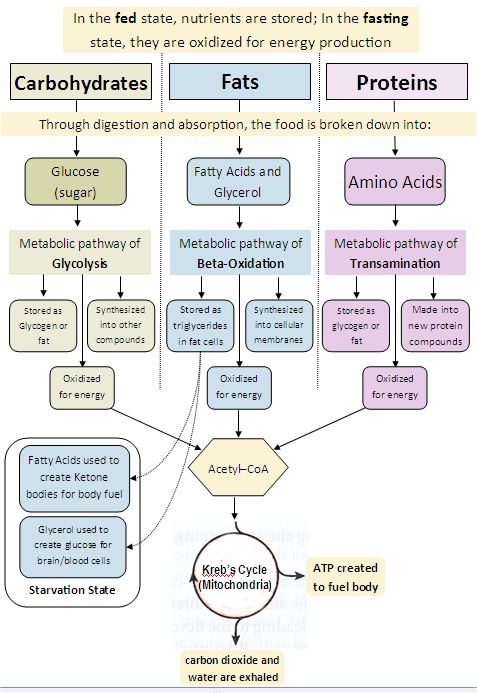will your body store fat after a 600 calorie meal no matter what its macro ratios?

hamlet1222
Posts: 459 Member
I see a lot of people saying carbs are bad because they provoke insulin production which tells your body to convert unneeded sugar to fat, but what happens to the fat you eat in a meal if your body doesn't need it for energy either? Does that not get stored straight as fat, and without the mucking about with insulin? As I understand it our bodies will alternate between storing and burning fat in time with our meals and activity levels, so the only thing that matters at the end of the day is was more fat burnt than was stored? Which brings me to the question of what 600 calorie meal macro combination would cause you to store more fat, assuming you just went and sat on the sofa afterwards?
0
Replies
-
All unused calories turn to fat. People with insulin/glucose issues might benefit from eating fewer carbs to better control their glucose.0
-
Your body stores and uses glycogen and fat through the day. It doesn't matter what your energy balance is at any particular moment, what matters is your overall balance through the days and weeks. I burn 2600 calories in an average day. I can eat 2100 calories in a single meal every day for a week and lose weight or I can break it up however I want and lose weight.
Macronutrients for the average person without medical issues won't really impact fat storage (not that you can eat 100% of 600 calories in pure fat or pure carbs or pure protein). We suggest an appropriate balance of macros in an entire day for energy (carbs), muscle retention (protein) and metabolism/hormones (fat).
If you managed to eat 600 calories of pure carbs, fat or protein the only way you are going to gain weight from that is if your other meals put you over your daily energy needs. 600 calories of any one macro might be temporarily stored as fat, but not long term in a calorie deficit. 0
0 -
You're overthinking this. Figure out how many calories you need per day. Eat slightly below that number.
Don't worry about specific macros relating to fat burn. If you want to sit on the couch then sit on the couch. Don't worry about meal timing. Unless you have a pre-existing metabolic condition don't worry about insulin.
Keep it simple. Don't worry so much. 0
0 -
The macros of that 600 calorie meal do not matter. What matters is the average calories per day for the week. Try looking at things more long term. What is your real concern?

 0
0 -
Thanks everyone, I was just wondering if I was missing something from the argument for eating low-carb, wondering if fat you eat sits in your stomach for longer or something.0
-
hamlet1222 wrote: »Thanks everyone, I was just wondering if I was missing something from the argument for eating low-carb, wondering if fat you eat sits in your stomach for longer or something.
You should look into the low carb eating groups on here for some of the reasons why they suggest doing it. One of the main things I hear is that they deal with less hunger when they eat higher fat. Low carb is not necessary for fat loss, a calorie deficit is. The macro break down you use for that should be based first on individual preference. If I do low carb I get crabby and I tend to binge eat.0 -
hamlet1222 wrote: »Thanks everyone, I was just wondering if I was missing something from the argument for eating low-carb, wondering if fat you eat sits in your stomach for longer or something.
Well, it is true that carbohydrates, particularly simple carbohydrates like sugars, are absorbed much faster. It doesn't actually increase or decrease fat gain or loss, but it can be worse from an appetite perspective - I could eat 600 calories of high protein food and feel very full, or 600 calories of very sugary food and be hungry again soon after.
So simply from a sanity point of view, I do eat less sweets than I did, but I don't categorically exclude them. Rather, I try to have more balanced meals so that if I do want a sweet treat, I also eat something else at that meal that is particularly filling as well.
For example, maybe I want a brownie after dinner, but I know it's not super filling, so for dinner I could have a grilled chicken breast, which is very satisfying and keeps me full for a long time. Then the fact the brownie isn't very filling doesn't matter as much.0 -
hamlet1222 wrote: »Thanks everyone, I was just wondering if I was missing something from the argument for eating low-carb, wondering if fat you eat sits in your stomach for longer or something.
http://health.usnews.com/health-news/health-wellness/articles/2015/08/21/whats-better-for-weight-loss-cutting-carbs-or-fatMeantime, a recent review of 59 studies on the low-carb, low-fat debate published in The Journal of the American Medical Association reported that while both diets led to significant weight loss, the low-carb diet led to moderately more pounds shed. Still, the researchers concluded that the effect was small enough that dieters are best off following the strategy that best fits their lifestyle.
After all, to some people, cutting carbs is painless and easy to do over the long term. To others, the thought of forgoing regular pasta nights is almost too much to bear, Hall says. To others, low-fat is synonymous with low-flavor. Maybe they can reduce their fat intake for a couple of weeks or months, but to lose the weight and keep it off, the change has to endure.
“Low-carb diets vs. low-fat diets fuel a constant debate in the nutrition community,” Bede says. “Each has their own pros and cons, but when it comes to effectiveness, one stands out over the other: whichever diet you can personally sustain.”0 -
Eat carbs and they are preferentially oxidised, fats are stored as a consequence. Eat more carbs than you can oxidise and your glycogen stores will be filled up with the excess.0
-
I just eat within my calorie restriction most of the time, I eat my carbs in the morning and after a workout as they are utilised well at this time with no consequences. I got used to not eating eg. rice with my dinners and desserts unless I'm dining out on a special occasion, I will have cake late. The next morning I will workout extra because of this. I heard our bodies work calories on a monthly basis, so as long as it all adds up within your calorie range, should be ok. Moderation and good timing I guess.0
This discussion has been closed.
Categories
- All Categories
- 1.4M Health, Wellness and Goals
- 398.2K Introduce Yourself
- 44.7K Getting Started
- 261K Health and Weight Loss
- 176.4K Food and Nutrition
- 47.7K Recipes
- 233K Fitness and Exercise
- 462 Sleep, Mindfulness and Overall Wellness
- 6.5K Goal: Maintaining Weight
- 8.7K Goal: Gaining Weight and Body Building
- 153.5K Motivation and Support
- 8.4K Challenges
- 1.4K Debate Club
- 96.5K Chit-Chat
- 2.6K Fun and Games
- 4.8K MyFitnessPal Information
- 12 News and Announcements
- 21 MyFitnessPal Academy
- 1.6K Feature Suggestions and Ideas
- 3.2K MyFitnessPal Tech Support Questions






